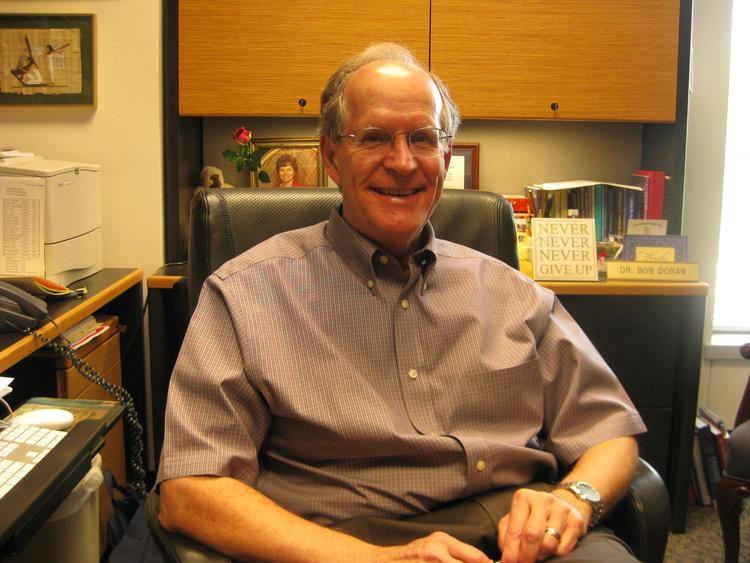When did you start with TCU?
I came here in 1969 in the fall…and I have basically been here ever since. So it has been about 42 years.
What sparked your interest in mathematics?
I was always surprised by people who could do advanced mathematics from the time I was small. I was not a very good student, and I have told students this many times on the first day. Until I met my now wife…she was going to be valedictorian of our class and I wasn’t a very good student and I wanted to take her to the junior prom. So I asked her and she said she”d love to go with me, and that changed my life, basically. I thought, “Wow, I am going to have to shape up and work hard.’ So I began to think about that, but I had not worked for so many years that after high school I basically decided I had to go into the military. That is how I went into the service first. I was sent from Iowa to Fort Hood, Texas. When I got out of the military then I went to the University of North Carolina and I thought, “I am going to have to get some math skills.” So I took the lowest level algebra course they had at the University of North Carolina-Chapel Hill in the summer of 1958. The discipline I learned in the military really helped me as a student. I applied this same discipline primarily to this math class, thinking that I would not do very well, but I did very well. I took two more that same summer. I was not going to do any more math until somebody actually dared me to take calculus. I had made A’s in all the preliminary classes, so I thought well I will try it. I got a wonderful teacher…Dr. Fred Lott…and he took a special interest in me. He said, “You have a lot of mathematical ability, I think you should think about being a math major.” I actually had loved math by then.
Can you describe the problem that you solved that no one else could?
After I came [to TCU] I was able to solve a really major, major problem in mathematics that had been unsolved for many years, posed by the American Mathematical Society president. He had posed this problem in 1949 and it remained open for many years until about 1970 when I solved it. It made a big splash and it was one of the reasons why I was invited to the Institute for Advanced Study because I had solved that big problem. When I solved it I did it in five lines, which made everybody look foolish. In fact [the president] wrote me a note. He said, “Dear Mr. Doran, Thank you for demolishing all the ridiculous contortions of all your predecessors. I enjoyed the proof.’
How long did that take you?
I worked on that about five years very intensely, and with no hope necessarily thinking that it would happen, either. You might spend the rest of your life working on it and never get it. This is the problem with math research. Somebody asks the question, you don’t know if it is true or false…there are questions that you can ask that are impossible to answer.
How did you come to know John Forbes Nash, Jr., the man “A Beautiful Mind” the movie was made about?
That has a lot to do with the fact that I was chairman of the board of trustees at the Institute for Advanced Study, because he lives in Princeton. I know him and we have had meals together and things like that. He is fine today, but in the movie he had serious problems, mental issues.
What do you consider one of your greatest mathematical achievements?
In 1989 I was the CASE (Center for Advancement and Support of Education) (Circle of Excellence) national gold medalist for the whole United States. I am the only one at TCU who has ever received that…Every year 500-600 universities in the whole country put forth their nominee and somehow you get it.
What advice can you give to general students?
My very first thought for the day that I usually start every class with no matter how advanced it is or otherwise: real happiness is not something that happens to us, but something that happens through us. So the principle of success, in my view, is what everybody is seeking. What’s my definition of success is to make every person who comes across my desk successful. As you live your life through, do everything that you can to place yourself below others so that you help other people achieve their goals…You have to make others successful, as a corollary you become successful.
What advice can you give to students pursuing mathematics?
The first thing I would say when I talk to young people that have a lot of ability in mathematics is to be sure and be true to that ability, and not go off and say, “Well I just want to make money with this ability,’ rather than to seek the truth of it. When I see somebody that has a lot of ability, I tend to try and encourage them to go all the way with that, see where God will lead you with it.





